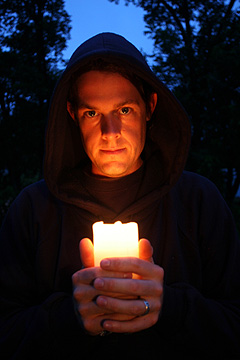 Eighteen years earlier, Robison’s son Larry, a diagnosed schizophrenic, had killed and mutilated his roommate and four neighbors in Fort Worth, the town where Langley was born and grew up. Outside Texas’ death-row unit, Langley, just out of SMU, was supposed to be taking pictures of the execution-night vigil. But for once he’d forgotten and left his camera in the car — and he couldn’t bear to go back and get it. Instead of capturing the moment on film, the 22-year-old instead found himself captured by what he saw and heard that night. It changed him forever.
Eighteen years earlier, Robison’s son Larry, a diagnosed schizophrenic, had killed and mutilated his roommate and four neighbors in Fort Worth, the town where Langley was born and grew up. Outside Texas’ death-row unit, Langley, just out of SMU, was supposed to be taking pictures of the execution-night vigil. But for once he’d forgotten and left his camera in the car — and he couldn’t bear to go back and get it. Instead of capturing the moment on film, the 22-year-old instead found himself captured by what he saw and heard that night. It changed him forever.
A year earlier, in the spring of his senior year, Langley had taken a course with SMU history professor and Amnesty International USA Chairman Rick Halperin. The class, called “Human Rights and the American Dilemma,” included the requirement that students create a piece of art illuminating a human rights issue.
“It could be anything we wanted — except for dance, he said, because he doesn’t know how to grade dance,” Langley said.
The Eastern Hills High School graduate had been on the photography staff of the SMU Daily Campus for three years and was photo editor in 1998 when the newspaper was named the best college paper in Texas. So, naturally, Langley chose a photography project. It’s a little more complex tracing back the reasons for the subject he picked: the effects of Texas’ active death chamber. Count his upbringing as the son of a Methodist minister for part of that — and probably also the night he got a personal introduction to the legal system’s capacity for injustice and violence.
For the project, he photographed his first death-house vigil in March 1999, and even then the project was changing him. In an impromptu speech on the day of his graduation from SMU a couple of months later, Langley had said he wanted to change the world through photography. But the following January, he had left his camera in his car and couldn’t capture the image of Lois Robison’s suffering outside the prison where her son was being killed.
“I just couldn’t bring myself to go get it and take the picture,” he said. “I just felt like it wasn’t appropriate. Even though I balked at that moment and didn’t take the picture, I think it was at that moment that I was like, ‘I can’t let this moment pass again.’”
And he hasn’t. A lot of things have changed for Langley since he stood on that Huntsville sidewalk with Lois Robison. He’s changed jobs, gotten married, moved away from Fort Worth and the Southwest. The lifelong Methodist has joined a Catholic commune, and in a few months he’ll become a father. But psychologically, Langley has stayed at Lois Robison’s side. His death-penalty photo project continues to this day. In fact, that moment outside the prison in Huntsville has taken him to a full-time calling that goes way beyond photography. He’s trying to change the world through a radical, ascetic lifestyle in service to the families of the condemned.
With the help of some of those families and with additional leadership from another Texan, Duke University theologian Stanley Hauerwas, Langley has become one of the most visible faces of the anti-death-penalty movement, in a state with one of the busiest death chambers in the country. Not the one in Huntsville, though. This one’s on a busy thoroughfare in Raleigh, North Carolina.
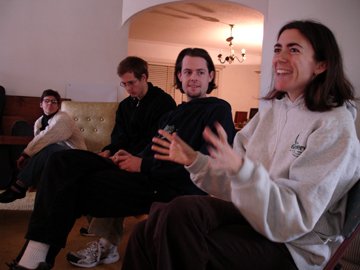 Since the Supreme Court reinstated the death penalty in 1976, only five states, including Texas, have put more people to death than North Carolina’s 42. Recent polls show that, while a majority of North Carolina citizens still favor capital punishment, recent exonerations of innocent death-row inmates have raised questions in enough people’s minds. An even stronger majority favors putting executions on hold long enough to conduct an in-depth study of the state’s capital trial system.
Since the Supreme Court reinstated the death penalty in 1976, only five states, including Texas, have put more people to death than North Carolina’s 42. Recent polls show that, while a majority of North Carolina citizens still favor capital punishment, recent exonerations of innocent death-row inmates have raised questions in enough people’s minds. An even stronger majority favors putting executions on hold long enough to conduct an in-depth study of the state’s capital trial system.
Nearly 1,100 North Carolina businesses, local governments, and community organizations have signed resolutions in favor of a death-penalty moratorium there, far more than in any other state. (By comparison, groups in Texas account for about 275 of these resolutions.) The North Carolina Senate approved a moratorium in April 2003, but the House opted instead to create a special committee to study flaws in the trial and sentencing system. Twenty inmates have been executed since then.
“North Carolina is probably the best- organized state for activity against the death penalty,” said Amnesty’s Halperin.
Since December, Langley and other protesters have been trespassing in the driveway of North Carolina’s Central Prison in Raleigh, the place that houses the state’s execution facilities and all 170 men on death row. (Four condemned women await execution at the North Carolina Correctional Institution for Women.) Between eight and 17 people have been arrested in the group’s failed efforts to disrupt the last four executions, a level of organized civil disobedience against the death penalty that experts say isn’t happening anywhere else in the U.S.
“North Carolina has really become the center of gravity when it comes to opposition to the death penalty,” said David Elliot, a former reporter with the Austin American-Statesman and now communications director for the National Coalition to Abolish the Death Penalty. “North Carolina is going to be either the first Southern state or one of the first Southern states to do away with the death penalty.”
Ten Southern states have been responsible for about three-quarters of U.S. executions over the past 30 years. The South is where the death-penalty battle will be won or lost, and it’s a religious war, pitting Old Testament moralism against New Testament mercy. The eye-for-an-eye standard of justice still rules, but People of Faith Against the Death Penalty, the organization leading the charge for a moratorium in North Carolina, along with a nucleus of students from Duke Divinity School, are calling on the citizens of North Carolina, 25 percent of whom are Southern Baptists or Methodists, to recognize Jesus himself as a victim of capital punishment.
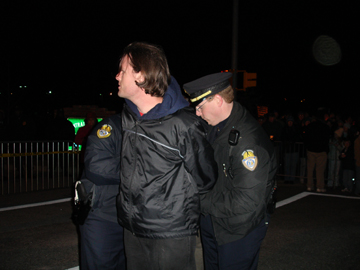 Langley and his wife, Sheila Stumph, have joined with the members of three other intentional communities — including many people who studied under Hauerwas — to lead repeated civil disobedience actions at the Central Prison over the past six months. Langley believes he and his colleagues must take action because no one else will, and he asks the police guarding the prison to help them stop the execution, right up to the time when they put the handcuffs on him.
Langley and his wife, Sheila Stumph, have joined with the members of three other intentional communities — including many people who studied under Hauerwas — to lead repeated civil disobedience actions at the Central Prison over the past six months. Langley believes he and his colleagues must take action because no one else will, and he asks the police guarding the prison to help them stop the execution, right up to the time when they put the handcuffs on him.
In the past two years he has become a leader and spokesman for the state’s abolition movement because of his experience with civil disobedience — he’s been arrested at least 18 times by his count — and because of his commitment to serving the families of death-row inmates.
In fact, his freedom is only one part of this life that Langley has put on the line for his cause. He and his wife have essentially given up their jobs and possessions to put their time and resources into operating a hospitality house in Raleigh where families of condemned men can find a bed, a meal, and friendship when they come to the prison to visit their loved ones or to protest — or, at the end, to hold vigil during executions.
In a strange twist, Langley’s Texas origins seem to lend him extra credence among death-penalty foes in North Carolina. His wife is from the Northeast, but she always answers the where-are-you-from question by saying, “Scott’s from Texas.”
“It carries a stigma,” he said. “And I think it’s a stigma that helps me.”
Hauerwas puts it another way: “We Texans are natural-born killers.”
Langley added, building toward a tent-revival preacher’s cadence: “It’s almost like I’m the converted. I voted for George Bush when I was 18, so I can say I’ve been in the valley. I have been saved. I’ve come a long way, brothers and sisters.”
Langley, now 29, is a preacher’s kid. His mother, Mary, worked during much of his childhood and adolescence as director of children’s ministry at the Meadowbrook United Methodist Church. He was baptized, confirmed, and married there. And that’s where he internalized the gospel story that would come to undergird his activism. He’s so confident that death- penalty opposition follows from faith in Christ, he hardly acknowledges that very few Christians see the connection. But rather than criticize them, he just takes action.
“When you grow up in the church, being a Christian, it’s like it all kind of revolves around the death penalty,” Langley said. He was talking as he and a reporter scraped paint off the old kitchen cabinets in a house that now is called Nazareth House. It is where he and his wife and a second couple provide help for death-row families. “If you believe in Jesus and follow Jesus, and he was executed, you know, it’s, like, how can you avoid the death-penalty issue, if you’re a Christian?”
He paused, searching for clarity.
“Usually, the wording is, you know, ‘Jesus died on the cross’ or ‘Jesus died for your sins,’” he said. “It’s never really so forward as to say, ‘Jesus was executed by the state,’ but that’s the reality of it.”
If Christianity was the kindling, the spark for Langley’s activism was something much less pious.
It was 1995, and he had just graduated from high school. Before dawn on Independence Day, Langley was messing around with three buddies behind a friend’s house, on a putting green at the Woodhaven Country Club. One of his younger buddies, a 15-year-old, was carving his name and an anarchy symbol into the carefully manicured soil. They were also throwing eggs at a building.
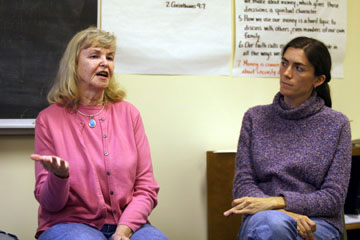 Suddenly, Langley heard yelling. He turned and saw two men in dark clothes running toward his group. One had a gun pointed at him. The attackers ordered them to the ground. Langley’s younger cousin rolled undetected into a ditch. Langley lay face down in the grass. One of the men knelt with his knee on Langley’s back and threatened to kill him if he moved. Langley was sure he was about to die at the hands of a Fort Worth gangster.
Suddenly, Langley heard yelling. He turned and saw two men in dark clothes running toward his group. One had a gun pointed at him. The attackers ordered them to the ground. Langley’s younger cousin rolled undetected into a ditch. Langley lay face down in the grass. One of the men knelt with his knee on Langley’s back and threatened to kill him if he moved. Langley was sure he was about to die at the hands of a Fort Worth gangster.
Then he heard a sound he recognized from tv — the jingle of handcuffs. He was relieved to realize he was only being arrested by Fort Worth police. Meanwhile, his cousin was still hiding in the ditch, covered in ants and his own vomit.
“That was a … very awful experience for an 18-year-old,” Langley said. “I wasn’t involved with crime in my life, you know? This wasn’t a normal part of my life, where police are beating down my door. This was like a real first exposure, and to have it so violent and so scary …”
It turned out that the country club had hired two off-duty police officers to provide security after vandals had damaged some golf carts and other equipment in the previous weeks. The guards were watching as Langley’s 15-year-old friend carved away at the putting green. Langley believes the officers mistook the anarchy symbol for a gang sign and didn’t realize they were dealing with nothing more than a bunch of bored kids. A Fort Worth police spokesman who recently examined the police report from that night explained that the officers (who are now retired) might have used force because the kids started to flee. As Langley waited, handcuffed, in a squad car, a representative of the golf course arrived and estimated the damage at $112,000 — including the golf carts, which Langley and his friends hadn’t touched.
Langley and an older friend spent the night in jail, charged with felony criminal mischief. The next morning, his bail was set at $1,500 and his friend’s at $1,000, even though the friend had a minor criminal record and Langley had none.
“We’re here for the exact same thing — why is our bail not the same?,” Langley said. “And if anyone’s supposed to have a higher bail, it’s supposed to be him because he had the record. There’s something wrong. This is arbitrary. Absolutely arbitrary.”
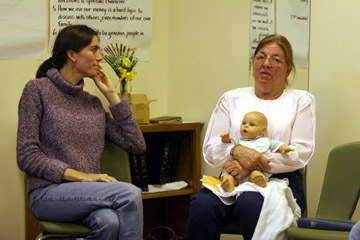 What really bothered him, however, was how money seemed to affect the outcome. His lawyer got the felony reduced to a misdemeanor trespassing charge, good for six months probation. “I never went to court once,” Langley said. “My attorney took care of everything behind the scenes, and my dad paid him big bucks.”
What really bothered him, however, was how money seemed to affect the outcome. His lawyer got the felony reduced to a misdemeanor trespassing charge, good for six months probation. “I never went to court once,” Langley said. “My attorney took care of everything behind the scenes, and my dad paid him big bucks.”
For an additional $700, the lawyer offered to clean young Langley’s record completely, wiping away even the arrest.
“I was like, ‘Whoa, this is messed up,’” Langley recalled. “Money can get you anything you want. … I never had to go to trial, never saw a judge, and now he’s offering to completely clear my record? I was just blown away.”
He turned the lawyer down. “I was becoming interested in issues of justice at the time, so I didn’t do it,” he said. “They took the felony off my record, thank God. That would’ve changed my life.”
It did change his life, of course, but instead of a felony record, Langley wound up with a chip on his shoulder. That fall, Langley enrolled at SMU, majoring in sociology. Taking classes such as “Crime and Delinquency,” he began to think that maybe his own mishaps with the justice system were not the exception but the rule.
He was also heavily involved on campus, shooting pictures for the newspaper, playing in various bands, and playing a big role in the United Methodist Campus Ministry, including leading summer mission trips to places like Nigeria and Kenya.
But all of that changed in the spring of his senior year. Halperin’s course, Langley’s death-row photography project, and another course on social movements all combined to give him the activist itch.
“Scott used to say that he dreamed of ‘evolving into Martin Luther King’ one day,” said his college girlfriend, Jenny Veninga, who grew up near Austin.
That same spring, Langley got his chance to fight for a cause he believed in. His friend Gary Larson had applied for a spot on the campus Methodists’ outreach committee for which Langley was the coordinator. Larson was denied a spot because he was gay and refused to take a vow of celibacy outside marriage.
When Langley couldn’t persuade the ministry director that the committee’s actions were wrong, he quit the outreach committee, stopped going to the Bible studies, and dropped out of other activities. He organized a group to support equal treatment of students regardless of sexual orientation. He and his friends marched on campus — the first political demonstration on the SMU campus in Halperin’s memory.
“Scott was just the best ally that I could ever know,” said Larson, who had gone on an African mission with Langley two years earlier. “He didn’t have to fight this, but he did.”
Langley and his friends collected more than 1,000 signatures to put a referendum on the student body election ballot to add “sexual orientation” to the university’s non-discrimination policy. The student body endorsed it, and so did the faculty senate.
“I had people on the Board of Trustees calling me saying, you know, ‘Don’t do this,’” Langley said. The trustees did approve the policy change, but it didn’t cover Larson’s original application because the UMC outreach committee was a private religious group, not an arm of the university.
At the same time, Langley was learning about the death penalty through his photo project and Halperin’s class. He joined the campus chapter of Amnesty International and traveled regularly to Huntsville to witness execution vigils.
“I was really struck by the fact that anyone — a student in particular — would be that concerned on that issue, in this state, to make a 10-hour round-trip journey for that reason,” said Halperin, who added that in 31 years of teaching, he knows of no other students who “have allowed their conscience to dictate their actions like Scott.”
After he graduated with a minor in psychology, Langley went to work for the Plano Star-Courier as a photographer. He continued his death-penalty documentary on the side. In September 2000, he moved to Boston with his girlfriend, who was enrolling at Harvard Divinity School.
“I was just ready to get out of Texas because at that point I had been there for 24 years, I guess, living in the same 30-mile radius of where I grew up,” he said. “I just wanted something different.”
The Northeast turned out to be an activist’s paradise for Langley. He joined a local Amnesty International chapter and started his first campaign to stop an execution. A few weeks after that, he attended an anti-death-penalty rally, and a counter-protester grabbed a three-foot wooden cross out of his hands and assaulted him with it.
“I always think it’s funny because I lived 24 years in Texas and never got beat over the head with a cross once,” he said. “Until I went to liberal Massachusetts.”
Langley worked for a couple of different charitable groups, but he soon discovered Haley House, which is to say he found his home. Langley quit his job, sold most of his possessions, moved in with about half a dozen others, and became a Catholic Worker.
The joke about these lay monastics is that they don’t have to be Catholic and they don’t have to work. In three years at Haley House, he roomed with Jews, Buddhists, and Baptists. He spent his days befriending the homeless and hungry who came to breakfast on the first floor of the antique row-house every morning.
When his mom teased him about his lifestyle, he replied that “I’m just doing what Jesus said to do,” she recalled. An ordained Methodist minister, she acknowledged that her son’s way of life is not the norm, even for the most committed of Christians. “It is kind of a lonely existence.”
Langley’s girlfriend was also an activist, but the Catholic Worker lifestyle wasn’t for her. They broke up. A few months later, in April 2002, Langley met Stumph at a weekend of political rallies in Washington, D.C. While protesting U.S. military aid to Colombia, Langley and Stumph were both arrested. “Eleven hours after we met, we were shown on CNN all around the world holding hands and getting arrested,” said Langley. “It was meant to be.”
By the summer of 2003, Stumph, a cradle Catholic from rural Chatham, N.Y., had left her job in Philadelphia with another activist group and moved into Haley House in Boston. The trip to Texas to meet her future in-laws included a unique detour: She and Langley visited a man on death row with whom Langley had been corresponding. The stop in Huntsville gave her a sense of urgency about the issue.
“I looked around at everyone else in the waiting room, and it was moms and dads there visiting their sons,” she said. She realized that capital punishment punishes more than just the killer. On their way back to Boston, the couple stayed at The Hospitality House in Huntsville, a Southern Baptist ministry that serves about 5,000 death-row visitors each year. Stumph and Langley felt a sense of calling: They would open a death-row hospitality house in a state that needed one.
They also knew they wanted to expand the Baptists’ vision of hospitality to include political action against the death penalty. Langley saw condemned inmates as potential victims of an unjust legal system. And in getting to know many of the prisoners, he had also begun to see them as people like himself.
His outrage at the system was only confirmed the following spring when the Massachusetts legislature started talking about cutting funding for substance-abuse treatment and prevention. Many of the regulars at the Haley House soup kitchen had been in and out of jail or detox centers.
“There was a great chance that people we knew and loved and had come to know could die on the streets because they had no place to go and were struggling with addiction,” Langley said. He, Stumph, and some other activists showed up at the statehouse and refused to leave a legislative hearing until lawmakers restored the cuts. Police escorted them to jail.
“I’m sitting in there, and I look up, and this guy Patrick, who’s a guest in our soup kitchen, walks into the cell,” Langley said. “I’m like, if you really want to live your life with the poor, obviously this is the place to do it.” For him, going to jail is not just a pesky consequence of standing up for his convictions; it’s actually a means of identifying with families who suffer at the hands of the legal system.
In July 2002, Langley and Halperin were among six protesters arrested for demonstrating on the steps of the U.S. Supreme Court on the 25th anniversary of the nation’s first execution following the reinstatement of capital punishment. “I haven’t been arrested with any other former students,” Halperin said. “None of them have taken this issue to their heart to that degree.”
In the summer of 2004, Langley and Stumph opened the Raleigh Catholic Worker Hospitality House for Death-Row Families in a small rented bungalow about a quarter-mile from North Carolina’s Central Prison. The couple immediately began writing to the prisoners and hosted their first guests in December of that year.
A native North Carolina couple, Scott Bass and Roberta Mothershead, had been praying specifically that some young Catholic Workers would come to Raleigh and help them expand their ministry of hospitality to the homeless. The two couples were soon talking about joining forces. In January of this year, Bass and Mothershead bought a 57-year-old, sprawling granite house in which to create a larger Catholic Worker community. They call it Nazareth House.
Mothershead abandoned her veterinary practice to devote her time to Nazareth House work, while Bass kept up his family-counseling work to bring in the community’s only income other than donations. Langley and Stumph brought their donor network and their penchant for civil disobedience.
In the smaller house where they had started the ministry, Langley and Stumph had set up their bed in a laundry room to keep the two bedrooms open for guests. Vegetarians, they had been living off food salvaged from supermarket trash bins. They found plenty of fresh fruits and vegetables and loaves of packaged breads just past their expiration dates.
At the new house, which sits on an acre of land about three miles from the prison, they have their own bedroom and have planted an organic garden to help keep the fridge full. The two couples renovated the house in the midst of a busy speaking schedule that carried Langley and Stumph all over the Carolina Piedmont.
In Nazareth House, the relatives of condemned men find a place to eat and sleep and someone to listen to their stories. The two couples don’t offer any legal expertise to the families, just friendship.
Langley likes to trade barbs with one of their regular guests, Elmer McNeill, whose son Ray is on death row for killing two Food Lion employees during a robbery. The elder McNeill sometimes kids Langley about his “Don’t Mess with Texas” bumper sticker, suggesting it refers to his support of President Bush. Other times, he jokes that Langley is probably spending hospitality-house donations on his political causes. Langley glances at McNeill’s black Knights of Columbus ball-cap and swears that he only spends money that comes directly from the K of C.
“We just try to joke to keep from cryin’,” McNeill likes to say.
Stumph and Langley’s premise is that inmates’ families are the forgotten victims of violent crime, and someone needs to listen to them, even if it’s only the hundred or so people who stood vigil alongside Lois Robison in January 2000, or even if it’s just themselves — two young Catholic Workers and the new friends who have joined them in the swirling storm that is death-penalty activism in North Carolina.
A few months ago, Langley and Stumph broke federal law by traveling to Cuba to protest the torture of prisoners at Guantanamo Bay, a story that was picked up by the Fort Worth Star-Telegram. The couple has been answering interrogatory letters from the U.S. Treasury Department over their illicit vacation, but so far they haven’t been charged with a crime.
Stumph seems calm about the prospect of raising their baby, due in October, amid the uncertainties and poverty of the life she and Langley have chosen. “I have Scott to thank for getting me into this mess,” she said with a laugh during an interview a few months ago.
Langley has been arrested at the past four executions in North Carolina. His wife has been with him every time, except at an execution on St. Patrick’s Day when she was suffering through a bout of pregnancy-related stomach upset.
The couple is relying on Medicaid for healthcare coverage for Stumph and the baby. The couple pays no rent, donations are strong, and a wedding-day nest egg gives them some temporary security. They can look to other Catholic Worker families — two of them right in the Raleigh area — as examples, but maintaining their lifestyle with a child will not be easy.
“I hope that doesn’t stop us from still being able to take risks,” Stumph said. “I think it’s great for kids to see their parents caring about the world and trying to change the world.”
Langley was one of 10 activists convicted last month in North Carolina on trespassing charges from executions in January, March, and April. The “Raleigh 10” represented themselves, arguing that Christian duty required them to block the prison driveway to prevent the legally mandated witnesses from entering and thereby disrupt the execution. Hauerwas was their expert witness. He testified that Christians living in a democracy must challenge unjust laws, offering the example of civil rights movement sit-ins. Langley delivered the closing statement.
“Our actions were minor and reasonable compared to the homicide or the murder that took place that night at the prison,” he said. “We acted under a moral obligation to stand in the way.”
A few minutes after silent deliberation, Wake County District Court Judge Don Overby said, “Having grown up in the ’60s, I admire your convictions.”
Langley had asked the judge to declare capital punishment illegal, but Overby said he could rule only on the trespassing charge, to which the group had already confessed. Overby found them guilty but continued his judgment, meaning the conviction will stick only if they repeat the offense.
After the trial, Langley said they will trespass again if the state moves to execute another prisoner.
“They frighten the hell out of me because they live what I say,” said Hauerwas. “They’re doing what young people ought to do.”
In early May, Stumph sat between Roberta McNeill and Peggy Kandies at a special Mother’s Day forum for death-row mothers. Elmer McNeill was also there. The three are regular guests at Nazareth House. They carpool twice a month from near Charleston, S.C., to visit their sons on death row. Last summer, these death-row parents went to Washington, D.C., with Langley and Stumph to demonstrate against capital punishment in front of the Supreme Court. In the week before Mother’s Day, they met in a small classroom at Raleigh’s Pullen Memorial Baptist Church, a hotbed of local activism where Langley worships and plays in the orchestra.
Stumph presented a yellow rose to Kandies, whose son Jeff is on death row for the rape and murder of his then fiancée’s 4-year-old daughter in 1992. Peggy insists he was framed.
His case is pending in a federal district court after being remanded from the Supreme Court of the United States to re-examine his claim that the original North Carolina trial court improperly allowed the prosecutor to exclude black potential jurors from the panel. Kandies is white, but studies have shown that black jurors are less likely to side with the prosecution.
Kandies’ jury convicted him and condemned him to death despite expert testimony that he suffered from alcoholism and that mental illness had impaired his judgment. His lawyers claim that other evidence points to Kandies’ innocence, but they will have no opportunity to present it until his clemency hearing with Gov. Michael Easley. Based on the Supreme Court’s July 2005 decision, the jury selection process is the only element of the original trial eligible for continued appeals.
Langley believes most of the inmates on death row are guilty, but it doesn’t really matter to him: They’re still creatures of God and fellow human beings, and their families suffer whether they’re guilty or not.
“I feel like everyone can change their life,” he said. “Anyone can be redeemed. If you read any of the letters that we get from people on death row at our house right now, it would prove it. There are some … very compassionate, caring people.”
At the gathering, Peggy talked about running out of money from renting hotels and then sleeping in her car when she would travel five hours from home to visit her son. She also told of sending Christmas gifts and writing letters to other inmates on death row, who are now her son’s only friends. “That’s the things that you have to do to help your son,” she said.
Sitting on Peggy’s lap was a life-sized baby doll dressed in a light blue and white-striped jumper that Jeff wore when he was an infant. The doll also wore Jeff’s bib, printed with the words, “Our Pride and Joy.” Peggy told of a small notice another new mother had put in her local newspaper on the day Jeff was born.
“She made a promise to her son that she would always take care of him and never let anything hurt him, and that was my promise to Jeff,” she said.
Peggy has spent the past 14 years trying to keep her promise, but her pleas for her son’s life have fallen on deaf ears. On this night, only 10 members of the Wake County chapter of People of Faith Against the Death Penalty were listening. Langley sat quietly in the back of the room snapping photographs. It was a moment he couldn’t let pass. l
Jesse James DeConto is a freelance writer living in Carrboro, N.C. He has written for Reason, E: The Environmental Magazine, and Sojourners. Contact him at deconto@email.unc.edu.s











